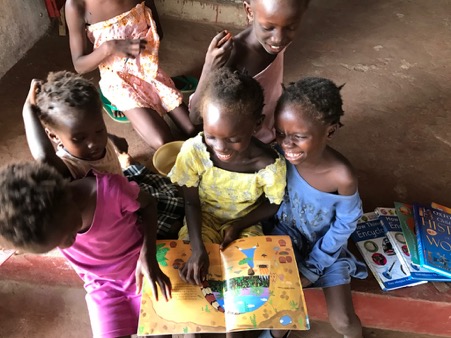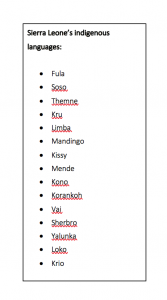Literacy Skills for Sierra Leone in 21st Century
To what extent do you believe the literacy skills required for a new world will be more or less the same as they were before?
Will new literate practices need to be generated and does that mean that new literacies be required? If so, what do you think these new literacies will be and how can they be learned?
Part of the Global Teacher Series

Literacy of any sort is still a significant challenge for many communities in the world and for much of rural Sierra Leone this is certainly true. Sierra Leone, like much of Sub-Saharan Africa is rich in tribal groups and languages. A country the same size as Wales has many different indigenous tribes and languages but none of these were originally written languages although all are rich in oral traditions. The phonetic transcription that now takes place is in order to preserve the languages and is not accessible to most of those who daily use the languages. The use of Krio as the lingua franca means that children learn their mother tongue first, learn Krio as a bridging language that enables them to talk between tribal groups and then learn English at school. Children’s books in Themne, Mende and other languages do not exist so early reading at home cannot happen in one’s mother tongue. Reading is often perceived as more of a chore than a pleasure.

Studying in one’s third language is challenging to say the least and the disadvantages of having to learn all foundation concepts and ideas and do all major developmental learning in a third language rather than one’s mother tongue are great.
In EducAid, we are more fortunate than the average Sierra Leonean school in that we have a number of books, donated by British schools & friends of EducAid and this is invaluable. We work to support our youngsters in their enjoyment of reading with exciting and relevant materials. Overcoming these issues relating to literacy competence and supporting a strong command of the written and spoken word are a key part of our work. Strong language use is a crucial component for building a foundation for critical thinking and logic which are in turn so vital to successful global engagement, economic activity, democracy and accountable governance – the blocks that will enable us to build our way out of poverty and make our EducAid vision real: A dignified, democratic and globally engaged Sierra Leone where poverty is eradicated by educated citizens.

When we think about the way forward to the literacy skills our children need for the Fourth Industrial Revolution and the future, we still strongly believe that whether the means of communications be social media, books, telecommunications, digital media or other, the heart of how we form ideas and pass them on is still language. Command of the written and spoken word will still be what people need.
Of course, at EducAid, although it is a constant struggle, we work hard to get access to ICT hardware to support the development of computer literacy skills but without good language mastery, they cannot use the best equipment well. We can’t even imagine the technologies that are coming but although over the years language evolves, it remains the manipulation of words to express concepts and so this is what we must first master so we are well placed to receive and share words and thus ideas on whatever platform comes along next. When we have language, we have the tools to build the Sierra Leone we long for.
If you are interested to know more about EducAid’s work with vulnerable young people, please go to www.educaid.org.uk
If you are interested in supporting our work, please go to: https://www.educaid.org.uk/get-involved/donate/
If you would like to buy a book to support our children’s literacy please go to: http://amzn.eu/48rPmGW